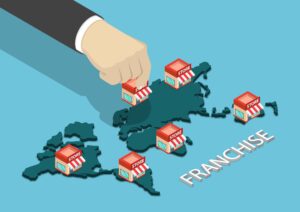Is Sub-Franchising a More Viable Route For Aspiring Lottery Operators?

The process and procedure of obtaining a national license to operate lottery business in Nigeria might be a tedious and expensive one for some people who wish to enter into the gaming business. There are about 24 licensed operators in the country at the moment, but only about 10 operators are in active business operation. Some people after acquiring the license which stands at the sum of N100 million plus other costs and exigencies, cannot operate due to financial difficulties occasioned by the high cost of license acquisition and an environment that is not so enabling for profitability.
The question then would be, is it a more viable route to incorporate sub-franchising (sub-licensing) as an alternative to obtaining a full license by an individual or body corporate (which seemed to be the original intention of the government).
What is Sub-Franchise in the context of lottery business operation? It simply entails giving a person or body corporate the permit to manage, promote, conduct or operate any lotteries by a National License holder within approved jurisdiction, but subject to the approval by the Commission (NLRC). What this would imply is that any person or body corporate interested in a franchise to operate a lottery business in the country would go to a national licensed operator to be sub-franchised subject to the terms of the operator’s existing license and such sub-franchising agreement will also be subject to the approval of the Commission.
Sub Franchising in the lottery Industry is made possible by virtue of Section 23 of the National Lottery Act (NLA), 2005 which stated as follows
“Subject to this Act, a licensee may, with the approval of the Commission, appoint, contract or otherwise engage any person or body corporate as an operator or agent to manage, promote, conduct or operate, on behalf of the licensee, all or any of the lotteries to which the licence relates”.
It is important to distinguish between Sub Franchising and Agency. In a Sub-franchise, the sub-franchisee can introduce games alien to that of the ones operated by the sub-franchisor as long as it relates to the license in question, making the franchisee a quasi operator, whose business though independent is powered by the subsisting “national licensee” who is then answerable to the Commission on an agreed modus operandi. Whereas, Agency would strictly require any person or body corporate engaged as a partner or agent by a licensed operator to manage, promote, conduct or operate on its behalf the lotteries to which the licensed operator engages in. The partner/agent gets paid certain commissions as prescribed by the licensed operator and their draws will be the same as the licensed operator.
- Would it more beneficial to the industry for the regulator to give operators a free rein to engage in sub-franchising in the strict sense of it?
- Would it bring more sanity to an industry on the verge of over saturation due to too many issued licenses?
- Would it help to reduce the burden faced by person (s) or body corporate (s) wishing to engage in the business of lottery but fazed by the daunting expense of acquiring a license.
- Would it help with better regulation?
The sub-franchise agreement would be a legal agreement between the franchisor and the franchisee, which will set out the key factors for running the business (renewal terms, termination, duration etc.) and the party’s obligation both to each other and to the government. The duration for such agreement is usually for a fixed term; or for the life of the license.
I believe the gaming industry would benefit more if licensed operators come together to form mergers especially the ones struggling and then given the free rein to contact as many franchisees as they chose. The franchisor can if it so chooses, through a centrally organised marketing, generate more business for their entire network; thereby capitalizing on economies of scale. The marketing team of the franchisor can pool small amounts of money from the franchisee (s) to enable a larger advertising activity that will not only benefit their network as a whole but the industry as well.
Conclusion
If the questions above can be answered in the affirmative, then maybe it’s time this route is given a serious nod by both the operators and the regulator, as an easier and less expensive way to operate and expand the lottery business in the country.






